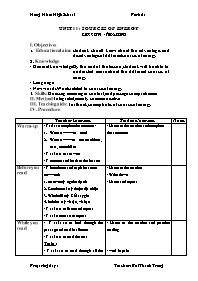Thiết kế bài dạy Tiếng Anh 11 - Unit 11: Sources of energy - Lesson 1: Reading

I. Objectives:
1. Educational aim: students should know about the advantages and disadvantages of different sources of energy
2. Knowledge:
- General knowledge: By the end of the lesson, students will be able to understand more about the different sources of energy
- Language:
- New words: Words related to sources of energy
3. Skills: Guessing meaning in context, and passage comprehension
II. Method: Integrated, mainly communicative
III. Teaching aids: Textbook, some photos of sources of energy
IV. Procedure:
Bạn đang xem tài liệu "Thiết kế bài dạy Tiếng Anh 11 - Unit 11: Sources of energy - Lesson 1: Reading", để tải tài liệu gốc về máy bạn click vào nút DOWNLOAD ở trên
Unit 11: sources of energy Lesson 1 -Reading I. Objectives: 1. Educational aim: students should know about the advantages and disadvantages of different sources of energy 2. Knowledge: - General knowledge: By the end of the lesson, students will be able to understand more about the different sources of energy - Language: - New words: Words related to sources of energy 3. Skills: Guessing meaning in context, and passage comprehension II. Method: Integrated, mainly communicative III. Teaching aids: Textbook, some photos of sources of energy IV. Procedure: Teacher’s activities Students’ activities Notes Warm-up - T asks sts complete the sentences: We use ----------to cook We use ---------to run machines, cars , motorbikes - T asks sts to answers - T corrects and leads to the lesson - Listen to the teacher and complete the sentences Before you read - T introduces and explains some new words 1. reserve (n): nguồn dự trữ 2. Geothermal (a): thuộc địa nhiệt 3. Windmill (n): Cối xay gió 4. Infinite (a): vô tận, vô hạn - T asks sts to listen and repeat - T asks some sts to repeat - Listen to the teacher - Write down - Listen and repeat While you read - T asks sts to look through the passage and read in silence - T asks sts to read the text Task 1 : - T asks sts to read through all the words and the sentence in the task. - T asks sts to work in pairs to do the task within 4 mins. - After 4 mins, T asks sts to give their answers and explain - T corrects their mistakes and gives comments Task 2: - T asks sts to read the table carefully to find the key words. - T ask sts to read the text again and located the key words in the passage - T asks sts to work individually to do the task within 4 mins. - After 4 mins, T asks sts to give their answers on the board and explain - T corrects their mistake and gives comments Task 3: - T asks sts to read the passage again then answer the questions in groups within 3 mins. - After 3 mins, T asks two sts to give their answers on the board. - T corrects their mistakes and give comments - Listen to the teacher and practice reading - work in pairs Expected answer 1.released 2.alternative 3.energy 4.limited 5.exhausted - Work individually Expected answers Sources of energy Adv disadv Nuclear Provide electricity for world’s need for hundereds years Dangerous Solar energy Plentiful, clean, safe, infinite Water power Gives energy without pollution Expensive Wind power Clean energy, there’s a lot of it If the wind doesn’t blow, there’s no energy Geothermal heat Available only in a few places in the world -Listen the teacher and answer the questions in groups Expected answers 1. Fossil fuels ( oil, coal , and natural gas) (line1,paraghaph1) 2, 6 sources : fossil fuels, nuclear power, solar energy, water power, wind power, geothermal heat .Sun energy has the most potential because it is plentiful and infinite. At the same time , it is clean and safe to use After you read For advanced students Wrapping - T summarizes the main points of the lesson - T asks sts to learnt by heart all the new words and prepare for the next lesson at home Listen to the teacher
Tài liệu đính kèm:
 U11 reading.doc
U11 reading.doc





